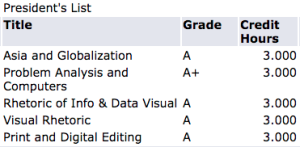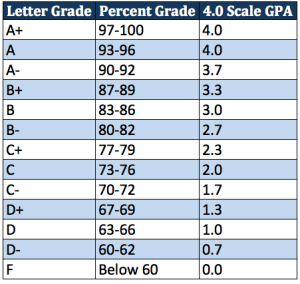 Just as we were taught in high school, there is a strong aura of having a high GPA as you step in your first college classroom. Sometimes advisors, professors, or parents send explicit or implicit messages that reinforce staying on top of your grades is the number one concern.
Just as we were taught in high school, there is a strong aura of having a high GPA as you step in your first college classroom. Sometimes advisors, professors, or parents send explicit or implicit messages that reinforce staying on top of your grades is the number one concern.
Through my experiences and research, I believe having a high grade point average is an overgeneralized message to students.
For some students, they need a high GPA to get job offers or acceptances into their specific fields. But, the distinction needs to be made: this GPA requirement doesn’t apply to everyone, or even the majority.
For many students, they would be better off finding their career interest, building connections, and enjoying college, compared to studying all day and night for a high GPA.
So, I believe that a student’s number one priority should be finding their career interest, and then becoming a master in that field, and if that requires a high GPA so be it, but usually it does not.
Where GPA Really Matters: Industries With High GPA Cutoffs
If you want to work for an investment bank, big accounting firm, or elite consulting company, then you’re going to need a high GPA. For example, Goldman Sachs, Deloitte, McKinsey and many others are known to reject applicants solely based on having a GPA lower than 3.5. From my experiences, having a high GPA is one of the best ways to get in the door for an interview.

Because these companies are elite, they attract thousands of applicants, and thus can save time and money by having a minimum GPA requirement to weed out less qualified people. Many times, these jobs go to students with great grades at top schools. So, if you’re not at a target school, then you really need a high GPA. I’ve touched on how to study, focus, and write an effective paper to get As in your classes.
If you’re coming from a non-target school (meaning those companies don’t have on-campus recruiting at your school) and have average grades, then you’re in a deep, but not an impossible, hole. Reach out to alumni and make hundreds of cold-calls to try to get your way in for an interview. Once you’ve received an interview, then be totally prepared to impress them and market your skills.
Where GPA Really Matters: Top Grad And Professional Schools
Top grad schools and professional schools have even higher GPA expectations for applicants compared to elite companies. The average GPA for accepted students at Stanford’s Graduate School of Business is 3.7. The 2014 entering class at Harvard Medical School had an average 3.8 GPA. Yale Law School’s class of 2017 boasted a 3.91 median GPA. Now those are the best of the best, but the point is so you get the idea.

If you’re curious of the competition at Yale Law, check out some of their incredible profiles—which includes the Special Assistant to the Chief Prosecutor of high level Al-Qaeda operatives, Director General of the World Model United Nations, and a CNN Producer. This is why people call Yale Law School a black box of admissions, because you can have a near perfect LSAT score and GPA, but still get rejected. There isn’t much transparency.
(What’s it called when you apply to Yale Law? A Yail Mary. Get it? Like a Hail Mary football pass that involves crazy luck. I hope I’m not the only one who thinks that’s funny. Ok, no more joking. Let’s get back to business.)
For the best admission chance and maximum scholarship potential at top schools, you’re going to want around a 3.7-3.9 GPA. Remember that your test scores are most important, and your GPA is second most important in getting accepted to grad school. Other factors like recommendation letters, essays, and extracurriculars matter, but usually to a lesser degree.
If your goals require a high GPA, then it’s crucial you get off to a good start. It’s way easier and less stressful to have a strong GPA after your first couple semesters and work to maintain it, instead of starting slow with a B- and a C, and struggling to raise your grade point average to where you want it.
Situations Where GPA Isn’t As Important
Well, to be blunt, if you’re not in one of those situations above, then it’s likely that your GPA doesn’t matter as much. Since the majority of students do not go into investment banking, accounting, consulting, or elite grad schools, then the majority of students should not make their GPA their number one priority.
So what should be a student’s main focus? I’ve touched on this before and it’s one of the themes at Take Your Success: your main priority needs to be first finding, learning about, and becoming more skilled in your future field. That’s how you should invest a significant amount of your time and energy.
Now, this doesn’t mean that you should accept a 2.5 GPA as good enough. It just means that you can afford to study less and get a B+ in a class, to make time for your career interest.
If pursuing your future career means doing really well in your major classes, then go for it. If it doesn’t, then focus on doing things that will get you closer to becoming an expert. You can read, watch, and listen to the current stars in your field of interest and learn how they are successful and apply it. Get super involved and be a leader in one extracurricular activity that aligns with your future. Start a large project that requires constant attention.

What does this specifically look like? If you want to be a professional writer, then spending an hour a day writing (not school-related) will be much more valuable than studying all night to get an A in calculus. If you want to be a social studies teacher, preparing a lesson plan and reading scholarly articles on learning will help you more than freaking out about a Spanish exam.
Just to be clear, I think you should still strive for at least a 3.0 GPA, because it is still important in getting into grad school or to advance from the resume stage to the interview process. Then, all the time spent learning and leading in an extracurricular organization will give you the tools to ace any interview.
For Previous GPA-Related Material, Visit:
How To Convert Your GPA To A Weighted 4.0 Scale
Does Your GPA Matter To Employers?
How To Raise Your GPA: Three Unusual Ways



I couldn’t agree more with this article Brian!
Thanks Euan. I hope every student (eventually) understands.
Good and balanced article!
Glad you agree, thanks!